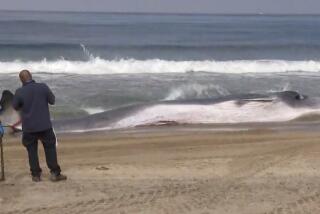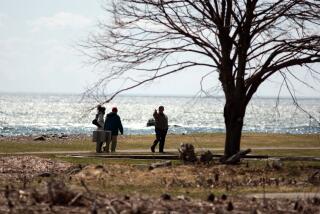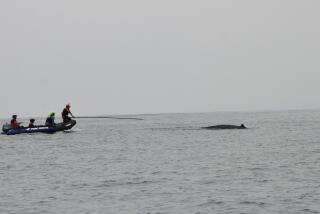Beached Whales Returned to Ocean
DENNIS, Mass. — More than 50 pilot whales beached themselves here on Cape Cod on Monday before hundreds of volunteers converged in a rescue effort that returned 46 of them to open waters. But nine of the highly social marine mammals died or had to be euthanized due to trauma or injury.
As rescuers tagged and measured two of the casualties on Chapin Beach, Sallie K. Riggs, president of the National Marine Life Center in nearby Buzzards Bay, called the event “a significant mass stranding” as well as a successful recovery effort.
“To get 46 animals back in the ocean is 46 success stories,” said Riggs, who noted there was “a high probability” that the whales would return within 24 hours.
The appearance of the 1- to 2-ton black sea mammals--which often travel in groups of up to 100--marked the largest beaching of pilot whales in at least a decade.
Two years ago, when a dozen pilot whales stranded themselves on Nantucket, the event was considered noteworthy, Riggs said. All the whales in the Nantucket beaching died.
Pilot whales take their name from their habit of following one or two dominant members of their pod, said Tony LaCasse of the New England Aquarium in Boston.
“Commonly, the leaders are mature females,” LaCasse said, “a good matriarchy.”
If the leader takes a wrong turn, grows disoriented or becomes ill, the entire pod follows for reasons marine scientists do not fully understand. As the tide went out early Monday, the lead whales directed the pod to a shallow, sandy beach at the elbow of Cape Cod.
The sight was “absolutely amazing,” said 42-year-old Bobby MacAri of Canton, Mass., who was vacationing on the Cape. MacAri said he went out for a pre-breakfast walk and saw “just a big, black pile” of whales, “like something you have never seen before.”
Soon he joined about 400 other volunteers who had formed a bucket brigade to keep the whales doused with saltwater. Many draped the whales with wet towels or blankets; some used shovels to try to dig the whales out from the thick sand where they were stuck.
“It was unbelievable,” said Brian Malone, a police officer who also serves as a natural resources officer here. “People were bringing wet sheets and all kinds of things to keep the whales cool.”
By midday, with the tide rising, volunteers were able to ease most of the whales back into deep water.
Some in the makeshift rescue crew were called up from the Cape Cod Stranding Network, a group of volunteers trained to respond to mass beachings, said Connie Merigo, head of the New England Aquarium’s rescue unit. Merigo said the rescuers paid careful heed to the large cluster of toothed, predator mammals that feed largely on squid and smaller fish.
“The difficulty with these animals is that they are very dangerous when they start to thrash,” Merigo said. “When they thrash their flukes [or tails], you are talking about a couple of tons of momentum.”
Because they are accustomed to the buoyancy of the sea, the pilot whales swiftly “become stressed and go into shock” when they surface on dry land, Merigo said.
Adult pilot whales can measure 15 to 25 feet in length. From colonial days until the early 1900s, Cape Codders hunted these mammals for the oil contained in their heads.
“They actually drove them onto the beaches,” LaCasse said.
Some volunteers speculated Monday that a lightning storm may have left the whales disoriented. Others suggested that the lead whale or whales may have been ill.
Katie Touhey, head of the Cape Cod Stranding Network, said she hoped the beached whales would not return, as often happens.
More to Read
Sign up for Essential California
The most important California stories and recommendations in your inbox every morning.
You may occasionally receive promotional content from the Los Angeles Times.










